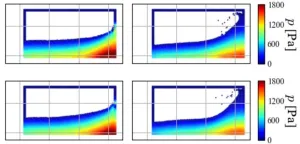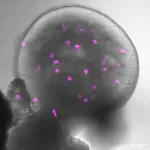(Press-News.org) (Philadelphia, PA) – Neurodegenerative conditions such as Parkinson’s disease and Alzheimer’s involve progressive neuronal loss due to disease-induced damage. An enzyme known as dual leucine-zipper kinase (DLK) plays a key role in this process, telling neurons that are damaged or unhealthy when they should cut their losses and self-destruct. Hence, sparing neurons from DLK is an attractive therapeutic strategy that could slow disease progression.
Past attempts to inhibit DLK’s action in human patients, however, led to unexpected side effects affecting the nervous system, suggesting that DLK also has beneficial effects on neurons and that blocking it indiscriminately is harmful. Now, in a new study published online April 3 in the journal Nature Communications, a group of scientists led by Gareth Thomas, PhD, Associate Professor of Neural Sciences in the Center for Neural Development and Repair at the Lewis Katz School of Medicine at Temple University, describes a more precise way to block DLK in damaged neurons, while preserving its function in healthy neurons.
The groundbreaking research reignites interest in DLK inhibition as a treatment strategy for neurodegenerative disease at a critical time, as cases of Parkinson’s, Alzheimer’s, and other conditions associated with neurodegeneration are poised to double by 2040.
This study exemplifies the innovative spirit and collaborative strength of our research community at the Katz School of Medicine,” said Amy J. Goldberg, MD, FACS, The Marjorie Joy Katz Dean of the Lewis Katz School of Medicine. “By uncovering a more precise way to protect neurons, Dr. Thomas and his team are paving the way for treatments that could truly change the trajectory of neurodegenerative diseases.”
In designing their breakthrough approach, Dr. Thomas’s team considered the way damage affects axons – the long, thin projections on neurons that convey impulses within the brain and spinal cord and to other regions of the body. When axons are damaged, DLK sends signals from the site injury in the axon back to the neuron’s nucleus, which triggers the self-destruction process.
Previous attempts to completely block the enzymatic activity of DLK caused the development of severe sensory neuropathy in patients.
“This clinical finding suggested that the conventional DLK inhibitor might be disrupting the normal structure and function of axons,” explained Dr. Thomas.
Confirming this idea, when his team treated cultured neurons with an existing DLK inhibitor, they indeed saw that axonal structure was rapidly disrupted. This inspired them to seek an alternative approach to more selectively block the enzyme.
“From some of our previous research, we knew that DLK initiates the self-destruction signals from very specific locations in neurons,” Dr. Thomas said. “We thought that if we could stop DLK getting to those locations, it wouldn’t be able to initiate the self-destruction process.”
Working with Dr. Wayne Childers at the Moulder Center for Drug Discovery in Temple’s School of Pharmacy and with Dr. Margret Einarson at Fox Chase Cancer Center, Dr. Thomas’s team sought to identify compounds that alter the location of DLK in cells.
“We screened more than 28,000 compounds and eventually hit on two in particular that protect neurons from DLK-driven damage,” Dr. Thomas said.
The two compounds not only protected cultured neurons from degeneration but also reduced DLK signaling in animal models. Very importantly, they did not cause the axonal disruption that they saw with the conventional DLK inhibitor.
“Our findings reveal an exciting, novel way to block DLK-dependent signals,” Dr. Thomas said.
Next steps involve working with medicinal chemists to make the compounds more potent and even more specific to minimize off-target effects.
“The current compounds also need to be made more stable if we want to move forward and develop them as drugs. We hope that moving this class of compounds toward the clinic may yield a valuable therapy for patients in the future,” he added.
Other researchers who contributed to the study include Xiaotian Zhang, Heykyeong Jeong, Jingwen Niu, Sabrina M. Holland, and Brittany N. Rotanz, Center for Neural Development and Repair, Lewis Katz School of Medicine at Temple University; and John Gordon, Moulder Center for Drug Discovery, School of Pharmacy, Temple University.
The research was funded by grants from the National Institutes of Health, Shriners Children’s, and the BrightFocus Foundation.
About the Lewis Katz School of Medicine
Founded in 1901, the Lewis Katz School of Medicine at Temple University attracts students and faculty committed to advancing individual and population health through culturally competent patient care, research, education, and service. The School confers the MD degree; MS and PhD degrees in Biomedical Science; the MA in Urban Bioethics; the MS in Physician Assistant studies; a certificate in Narrative Medicine; a non-degree post-baccalaureate program; several dual degree programs with other Temple University schools; continuing medical education programs; and in partnership with Temple University Hospital, 40 residency and fellowship programs for physicians. The School also manages a robust portfolio of publicly and privately funded transdisciplinary studies aimed at advancing the prevention, diagnosis, and treatment of disease -- with specialized research centers focused on heart disease, cancer, substance use disorder, metabolic disease, and other regional and national health priorities. To learn more about the Lewis Katz School of Medicine, please visit: medicine.temple.edu.
END
Researchers at the Lewis Katz School of Medicine at Temple University identify new targeted approach to protect neurons against degeneration
2025-04-03
ELSE PRESS RELEASES FROM THIS DATE:
Western diet causes inflammation, traditional African food protects
2025-04-03
A switch of just two weeks from a traditional African diet to a Western diet causes inflammation, reduces the immune response to pathogens, and activates processes associated with lifestyle diseases. Conversely, an African diet rich in vegetables, fiber, and fermented foods has positive effects. This study, published in Nature Medicine, highlights the significant impact of diet on the immune system and metabolism.
Lifestyle diseases such as cardiovascular diseases, diabetes, and chronic inflammatory conditions are surging across Africa, posing a growing challenge to healthcare systems throughout the continent. Increasing economic ...
Electrochemical method supports nitrogen circular economy
2025-04-03
By Shawn Ballard
Imagine a world where industrial waste isn’t just reduced, it’s turned into something useful. This kind of circular economy is already in the works for carbon. Now, researchers in energy, environmental & chemical engineering at Washington University in St. Louis have developed a promising pathway to convert harmful nitric oxide, a key component of acid rain, into valuable nitric acid, which is used in everyday applications from fertilizer production to metal processing.
Feng Jiao, the Lauren and Lee Fixel Distinguished Professor in the McKelvey School of Engineering at WashU, and collaborators developed a method ...
How researchers are shining a light on kidney disease
2025-04-03
For patients with polycystic kidney disease (PKD), a common genetic disorder that ravages the waste-removing organ with cysts, dialysis and transplantation are among the only treatments.
More than 12.4 million people worldwide suffer from the dominant form of the condition. Now, Rutgers University geneticists have uncovered fresh details of how the disease progresses – findings that could open the door to new therapies.
In a study published in Nature Communications, Inna Nikonorova, a research assistant professor in the Department of Genetics within the Rutgers School of Arts and Sciences, reports on a novel way to identify and track material carried ...
Some gut bacteria could make certain drugs less effective
2025-04-03
A new study, published today in Nature Chemistry by researchers from the University of Pittsburgh and Yale University, shows how common gut bacteria can metabolize certain oral medications that target cellular receptors called GPCRs, potentially rendering these important drugs less effective.
Drugs that act on GPCRs, or G protein-coupled receptors, include more than 400 medications approved by the U.S. Food and Drug Administration (FDA) for treatment of many common conditions such as migraines, depression, type 2 diabetes, prostate cancer and more.
“Understanding how GPCR-targeted drugs interact with human gut microbiota is critical for advancing ...
PEPITEM sequence shows effects in psoriasis, comparable to steroid cream
2025-04-03
Birmingham scientists have shown that a sequence of just three amino acids may reduce the severity of psoriasis, when applied topically in an emollient cream.
The researchers, whose study is published in Pharmacological Research, identified the smallest part of a peptide (small protein) called PEPITEM, which occurs naturally in the body and regulates inflammation.
The study also showed that both PEPITEM and the three amino acid (tripeptide) sequence delivered a significant reduction in the severity of psoriasis, that is comparable to a steroid cream.
Psoriasis ...
Older teens who start vaping post-high school risk rapid progress to frequent use
2025-04-03
A new study has found that young vapers in the United States who begin using e-cigarettes after graduating from secondary/high school are likely to progress rapidly to frequent use. While US youths who start vaping during secondary/high school typically take about three years to progress to frequent use, this newly identified group of young adults who start vaping a bit later, after graduation (mean age = 20 years), tend to reach frequent use in about one year. ‘Frequent use’ is defined as using e-cigarettes on 20 or ...
Corpse flowers are threatened by spotty recordkeeping
2025-04-03
Commonly called the “corpse flower,” Amorphophallus titanum is endangered for many reasons, including habitat destruction, climate change and encroachment from invasive species.
Now, plant biologists from Northwestern University and the Chicago Botanic Garden have added a new threat to the list: incomplete historical records.
In a new study, scientists constructed the ancestry of corpse flowers living in collections at institutions and gardens around the world. They found a severe lack of consistent, standardized data. Without complete historical records, conservationists were unable to make informed decisions ...
Riding the AI wave toward rapid, precise ocean simulations
2025-04-03
AI has created a sea change in society; now, it is setting its sights on the sea itself.
Researchers at Osaka Metropolitan University have developed a machine learning-powered fluid simulation model that significantly reduces computation time without compromising accuracy. Their fast and precise technique opens up potential applications in offshore power generation, ship design and real-time ocean monitoring.
Accurately predicting fluid behavior is crucial for industries relying on wave and tidal energy, as well as for design of maritime structures and vessels. ...
Are lifetimes of big appliances really shrinking?
2025-04-03
Big appliances, like washing machines, ovens and refrigerators, are a major investment for many households. Consumers hope that these appliances will last for decades. More and more, however, people have the perception that these big-ticket items might not be lasting as long as they once did.
But when Kamila Krych looked at actual trends in product lifetimes as a part of her PhD research at the Norwegian University of Science and Technology's (NTNU) Industrial Ecology Programme, she found that wasn’t quite true.
“Despite what people think, there is no evidence that product lifetimes are decreasing,” she said. “Many people think that products have been becoming ...
Pink skies
2025-04-03
Organoids have revolutionized science and medicine, providing platforms for disease modeling, drug testing, and understanding developmental processes. While not exact replicas of human organs, they offer significant insights. The Siegert group at the Institute of Science and Technology Austria (ISTA) presents a new organoid model that reveals details of the developing nervous system’s response to viral infections, such as Rubella. This model could influence pharmaceutical testing, particularly benefiting drug safety for pregnant ...



